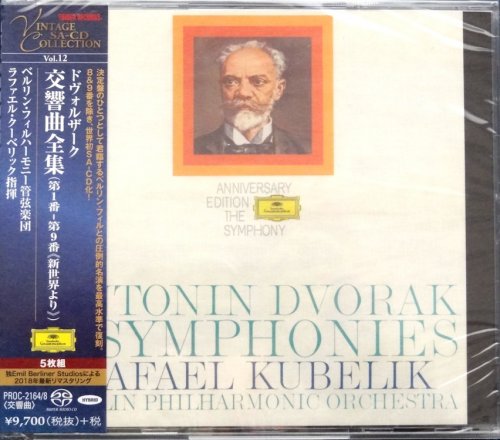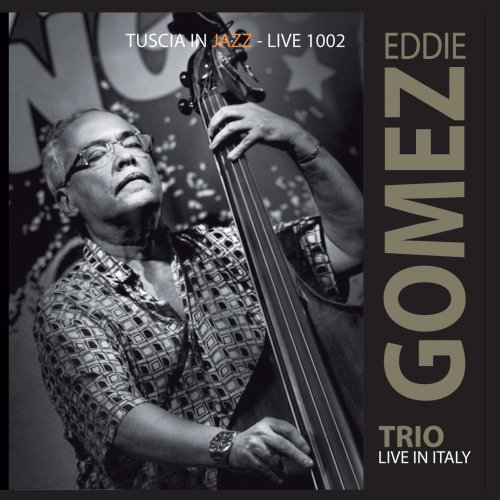Rafael Kubelik - Dvorak: 9 Symphonies (1966-1973) [2018 5xSACD Vintage Collection]

Artist: Rafael Kubelik
Title: Dvorak: 9 Symphonies
Year Of Release: 1966-1973 [2018]
Label: Tower Records [PROC-2164~68]
Genre: Classical
Quality: DSD64 image (*.iso) / 2.0 > 1-bit/2.8224 MHz
Total Time: 06:23:57
Total Size: 9,91 GB (+3%rec.)
WebSite: Album Preview
Dvorak's recordings, which always held a special position for Kubelik along with Smetana and Janacek, have been recorded on multiple labels since the monaural era. (At the same time, I recorded No. 8 with the Israel Philharmonic, but it was not released).Title: Dvorak: 9 Symphonies
Year Of Release: 1966-1973 [2018]
Label: Tower Records [PROC-2164~68]
Genre: Classical
Quality: DSD64 image (*.iso) / 2.0 > 1-bit/2.8224 MHz
Total Time: 06:23:57
Total Size: 9,91 GB (+3%rec.)
WebSite: Album Preview
This DG recording with the Berliner Philharmoniker began with No. 8 in 1966, and after several years, recorded as a complete collection from 1971 to 1973. From the 1970s, when there were still few recordings of the complete symphonies, to the present day, it is still a popular sound source along with DECCA's Kertesz board, which was the first complete symphony recording. At that time, the Berliner Philharmoniker made many recordings on DG toward the Golden Age of Karajan, but in DG after Stereo, there was only a New World recording by Karajan and Gerdes in the 1960s regarding Dvorak's symphony. (Karajan then recorded Nos. 8 and 9 for EMI). Kubelik was entrusted with the recording of Dvořák at that time, and its high expectations and evaluation can be seen. Regarding the placement of the orchestra, the first No. 8 was recorded in a general American style with a good bass playing, while the subsequent eight songs were recorded in a facing arrangement (contrabass is poorly played). , Perhaps Kubelik's intentions were strongly reflected, drawing out a traditional sound from the Berlin Philharmonic that is completely different from Karajan's sound, and it seems that the album was produced with an awareness of the effect on the song. The Berliner Philharmoniker, of course, had the highest level of functionality even at that time, and the response to Kubelik's high demands was wonderful, and even in session recordings, it was possible to occasionally hear passionate performances like live performances. It's even inspiring. Every section is a wonderful performance, but especially in the 8 songs recorded in the 70's, the technical level of timpani stands out. It is certain that In contrast to the works from the mid-term onwards, which are rich in terms of music, even in the early works, these performances, which emphasize beautiful melodies with overwhelming sensibility, have a charm that cannot be replaced by others, and are very attractive.
*As it is a machine translation, the result may not provide an accurate description.
Please use it only as a reference.
Tracks:
Disc 1
1. Symphony No. 1 in C Minor, B. 9, "The Bells of Zlonice"
2. Symphony No. 2 in B-Flat Major, Op. 4, B. 12 - 1st & 2nd movement
Disc 2
2. Symphony No. 2 in B-Flat Major, Op. 4, B. 12 - 3rd & 4th movement
3. Symphony No. 6 in D Major, Op. 60, B. 112
Disc 3
4. Symphony No. 3 in E-Flat Major, Op. 10, B. 34
5. Symphony No. 4 in D Minor, Op. 13, B. 41
Disc 4
6. Symphony No. 5 in F Major, Op. 76, B. 54
7. Symphony No. 7 in D Minor, Op. 70, B. 141
Disc 5
8. Symphony No. 8 in G Major, Op. 88, B. 163
9. Symphony No. 9 in E Minor, Op. 95, B. 178, "From the New World"
Personnel:
Berlin Philharmonic Orchester
Conducted by Rafael Kubelík
Recorded:
June 8 & 9, 1966 (8), January 18-21, 1971 (7), June 8-10, 1972 (9),
September 12 & 13, 1972 (9), October 1972 (4-6), December 1972 (2),
December 22, 1972 & February 22, 1973 (1), Jesus-Christus-Kirche, Berlin
![Rafael Kubelik - Dvorak: 9 Symphonies (1966-1973) [2018 5xSACD Vintage Collection]](https://www.dibpic.com/uploads/posts/2023-08/1692895822_back-obi.jpg)
![Eddie Palmieri - The Sun Of Latin Music (Remastered) (2026) [Hi-Res] Eddie Palmieri - The Sun Of Latin Music (Remastered) (2026) [Hi-Res]](https://img.israbox.com/img/2026-01/26/qrqzt1n7jvengh1vgnygtryfa.jpg)
![Emmanuelle Bonnet, Yvonne Rogers, Tabea Kind, Lucas Zibulski - Prérie(s) (2026) [Hi-Res] Emmanuelle Bonnet, Yvonne Rogers, Tabea Kind, Lucas Zibulski - Prérie(s) (2026) [Hi-Res]](https://www.dibpic.com/uploads/posts/2026-01/1769520812_folder.jpg)
![Gegè Telesforo - FunSlowRide (Remastered 2025) (2026) [Hi-Res] Gegè Telesforo - FunSlowRide (Remastered 2025) (2026) [Hi-Res]](https://www.dibpic.com/uploads/posts/2026-01/1769769552_cover.jpg)





